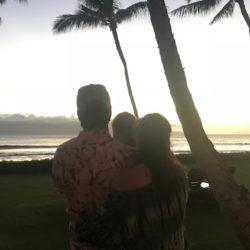One couple’s journey from concern to despair to finding hope and success with IVF treatment at RSC.

Before finding a fertility specialist, Lindsay kept hearing the same thing from her primary care physician each time she brought up concerns about conception: “There’s no reason you should have trouble getting pregnant.” But for five long and emotionally taxing years, Lindsay and her husband, Daniel, had no luck.
“I was nearing my late 30s, and we’d tried everything,” says Lindsay. “I did acupuncture, I changed my diet and we ended up trying Clomid, which didn’t work. We just kept getting told there was nothing wrong.”
Month after month Lindsay was staring heartbroken at negative pregnancy tests, wondering if having biological children was a fading dream. As she and Daniel began to research the adoption process and come to terms with not having biological children, she decided to bring up her concerns with her OB/GYN, who referred her to Reproductive Science Center.
“It was almost a relief to hear that I should go see a fertility specialist,” Lindsay explains. “Because up until then we had been told, ‘There’s nothing wrong, you should be able to do this.’ It wasn’t, ‘No you can’t have kids,’ it was, ‘You should be able to have kids.’”
Not long after, Lindsay and Daniel set up an appointment to meet Dr. Mary Hinckley.
A fertility specialist with a plan
During their visit, Dr. Hinckley was able to give the couple a clearer picture of what might be preventing them from getting pregnant, as well as how to address it. At last, they had a meaningful plan of action.
“She explained a lot of what I suspected already what could be going on,” Lindsay recalls. “I learned I had a mild case of polycystic ovary syndrome (PCOS). She wanted to explore all of our options rather than just dive right into IVF, which I really appreciated. At the same time, I was 35 by that point, so I had a sense of urgency, which Dr. Hinckley understood.”
Lindsay was ultimately diagnosed with unexplained infertility, meaning the exact cause of her struggle to conceive couldn’t be pinpointed. Unexplained infertility accounts for 10 to 30 percent of all infertility diagnoses. Despite the vagueness of this particular diagnosis, unexplained infertility can often be treated effectively.
Related Reading: Conceiving After an Unexplained Infertility Diagnosis
“I never felt pressured to do anything that I didn’t want to do,” explains Lindsay. “I just felt like I was educated in a way that no one had educated me previously. That was what I was looking for.”
After undergoing a few rounds of oral medications without getting pregnant, Lindsay, Daniel and Dr. Hinckley made the decision to move forward with in vitro fertilization (IVF), which would give them the highest odds of success.
“Once we started IVF, we got 15 embryos,” says Lindsay. “We implanted one, So I still have 14 embryos at the clinic. When we finally got that phone call letting us know I was pregnant, there were tears everywhere. I know that I am very lucky.”
In February of 2016, baby Ripley met her mom and dad.

Talking about the taboo topic of infertility
Having endured years of confusion, heartbreak and misunderstanding, Lindsay believes that infertility is a topic that should be discussed more frequently and openly.
“People just don’t really talk about any of it,” she explains. “It’s kind of this taboo thing. When I was trying to do research, it was actually really hard to find other women who had been through fertility treatment. I wanted to find info on other people’s experiences and how it affected them.”
Looking back, she wishes she’d been referred to a fertility specialist sooner.
“That’s my recommendation for anyone going through infertility – go to the specialist,” Lindsay says. “They know what they’re doing, they can monitor things more closely, and they can explain things well.”
With 14 embryos frozen in RSC’s lab, Lindsay and Daniel are open to the possibility of pursuing another pregnancy.
“Just knowing that I can go back and potentially use the embryos from the first round is comforting,” Lindsay says. “We may or may not do it, but just knowing that we won’t have to go through another five years of sadness is so reassuring.”

Breaking Barriers, Building Families
Since 1983, we have pioneered fertility treatment for every kind of family. We want to help you achieve your dream of having a baby.
Request appointment